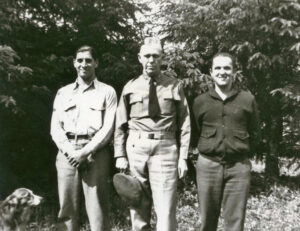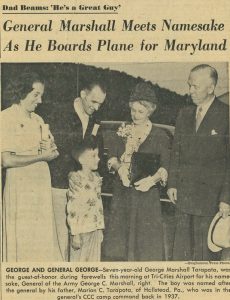
Marshall, Pat Saviola, and Marion C. Tarapata taken at Civilian Conservation Corps Camp, Saddle Mountain, near Seaside, Oregon.
In March 1933, President Franklin Roosevelt proposed the establishment of the Civilian Conservation Corps (CCC), a large-scale public relief program that would provide employment for young men in the areas of conservation and natural resource development. Roosevelt ambitiously sought to have 250,000 men enlisted in the program by July, and it quickly became apparent that the only organization in the government capable of organizing and commanding such a large number of individuals was the army. Starting in June 1933, George C. Marshall was responsible for overseeing CCC camps as part of a number of his commands, and he devoted considerable effort, resources, and time to ensuring these camps fulfilled their intended purpose.
At the time of President Roosevelt’s announcement Marshall was serving as the commanding officer of Fort Screven, Georgia. In June Marshall was given the added responsibility of serving as commanding officer of CCC District “F”, which involved supervising the establishment of 19 camps stretching over 450 miles from Georgia to southern Florida. In the short time that Marshall had commanded the newly formed CCC district he oversaw the creation of ten camps housing 1,879 men.
In July Marshall became commanding officer of the 8th Infantry with headquarters at Fort Moultrie, South Carolina. His new duties included serving as commanding officer of CCC District “I”, which included eleven camps throughout South Carolina housing 1,915 men. Marshall greatly enjoyed the opportunities that commanding CCC Districts provided to visit the camps for inspections and to interact with the officers and men at the camps. He was also proud of what his biographer Dr. Forrest C. Pogue described as “the visible transformation of the young men in the camp,” and he actively promoted the benefits of the CCC whenever he had an opportunity.

George & General George. Seven year old George Marshall Tarapata meets General Marshall. His father, Marion Tarapata, served at one of Marshall’s CCC camps.
Marshall’s assignment as senior instructor for the Illinois National Guard served as a brief interlude before he returned to supervising CCC camps as part of his duties as commanding general of the 5th Brigade at Vancouver Barracks, Washington. He oversaw 27 camps located in Oregon and southern Washington. Although Marshall’s involvement with these camps was primarily in a supervisory role, he repeatedly emphasized the role of the CCC in preparing the young men for “a position in civil life as a self-respecting, self-supporting citizen” to the camp commanders. Marshall also relished making frequent inspection trips to the camps where he enjoyed excellent hunting and fishing in the surrounding areas. It is no wonder Marshall considered his time at Vancouver Barracks as “one of our most delightful periods of Army service.”
Marshall described his work with the CCC as “the best antidote for mental stagnation that an Army officer in my position can have” and “the most instructive service I have ever had, and the most interesting.” In addition to providing Marshall and his fellow officers with an opportunity to, as Pogue wrote, “mobilize, organize, and administer a civilian force” in peacetime, Pogue also noted that Marshall’s experience with the CCC gave him “faith in the value and effectiveness of a citizen army” and helped him become “familiar with the civilian point of view in a way rare among professional military men.” Marshall’s work with the CCC provided him with valuable experience that he undoubtedly relied on when, as chief of staff of the United States Army, he was called upon to mobilize an army composed largely of civilians.
